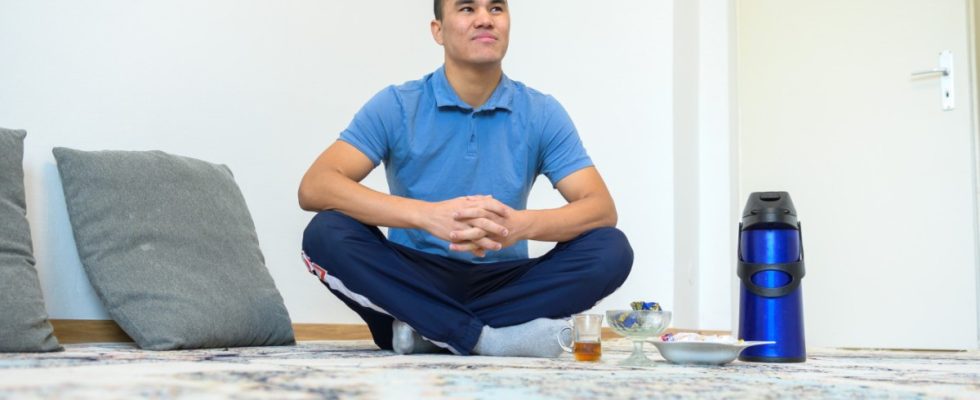If something is really important to you, you give it the right setting. In a junk box on the street, among the take-out items, Hashem S. found one that matched the certificate he worked so hard for. Now it hangs, neatly framed by him, on the wall in the sparsely furnished, small living room, and one word stands out on the handmade paper next to the red seal: bakery salesman. The Hofpfisterei would like to extend its “congratulations on passing his final examination” and hopes that his “professional and private goals and wishes will be fulfilled.”
But what does a person want from life, especially someone who was born in Kabul in 1999, in the middle of the Afghan civil war, who experienced the Taliban’s first reign of terror as a child and then the deployment of the NATO alliance led by the USA? Who was barely allowed to go to school for four years and had to clean in a bakery in the middle of the night at the age of eight for little food and a pittance? Whose mother died when he was too young to remember her today, and who later lost his father to cancer? Such a person wants nothing special from life, except perhaps that it has a future, a reasonably good one.
Hashem S. was 16 years old when he and one of his brothers dared to flee their homeland, where they, as members of the Hazara, a large minority, were repeatedly persecuted. The first genocide against the Hazara, who are probably of Turko-Mongolian origin, occurred at the end of the 19th century. When the Taliban recaptured Mazar-i-Sharif in 1997, they murdered at least 2,000 Hazaras. In 2021, when the Taliban once again overran Afghanistan and seized power, this terror continued, and the expulsion of the Hazaras continues to this day.
Their fate was impressively described in the 2003 novel “Kite Runner” by Khaled Hosseini. It’s about the friendship between Amir, who belongs to a rich Pashtun family, and Hassan from the persecuted Hazara ethnic group, who grows up as a servant in Amir’s father’s house. He is loyal to Amir, but is abandoned by Amir when neighborhood boys attack him. A tragic story develops from this, and when Hashem S. gives the book to his teacher at the vocational school, she also says that it was very nice, but that she had to cry at the end.
Hashem S. certainly didn’t have to endure as much as Amir, the Hazara from the novel. And it wasn’t enough to get asylum in Germany as a persecuted person. Hashem S. only got a secure stay in Germany because he was a minor when he arrived, attended a German course, finished secondary school and completed an apprenticeship. Considering he’s only lived here eight years, you can’t help but admire him for his excellent German. He gladly accepts the compliment, but immediately passes it on to his customers, with whom he deals with every day as a salesperson in a Hofpfisterei branch. “I learn from them every day,” says Hashem S., adding: “I am very grateful that I was able to stay here and build a new life for myself in my second home.”
Tea on the carpet – a couch would be nice
Since February 28th, this has also included a small apartment in Laim. It is currently only sparsely furnished; visitors are asked to sit on the soft carpet in the living room and serve tea in glasses and Iranian pastries. And when you spend a good hour sitting cross-legged and listening to him talk about his first home, you first realize how cold it is here. The electric night storage heaters in the somewhat outdated residential complex are obviously unable to cope with the cold of winter.
Or, and this is also likely, Hashem S. wants to save on additional costs because of the high electricity prices; the rent is 600 euros plus the rent for the underground car park (even though he has neither a driver’s license nor a car). He earns quite a bit in two shifts, but the 1,600 euros net go away like hotcakes in the bakery in Munich. If he has an early shift, he gets up at four o’clock and starts work at half past five.
That is the time when his eldest brother also starts work in Kabul. He sells hot milk, baked goods and fruit on the street, and the Taliban still tolerate it. But he has to pay taxes from his meager earnings and has to get off the streets again at nine o’clock, otherwise he will be fined. Hashem S. looks at Afghanistan with great concern; he fears that the Taliban’s rule will last for many years. And adds: “I also have a great longing for my old home.”
As a reminder of how hard he had to work there as a child, he has a photo on his dresser that shows him in the bakery. The family saved it for him, took a photo and sent it via WhatsApp. So it’s a little blurry, but it’s framed. “When I look at it, I know how hard it all was and that today wouldn’t be any better.”
But now it’s time to build something here. He will continue to be thrifty to buy the essentials to make the apartment more livable. “A couch and a bed, that would be important.” And a date next year, in December 2024, is also important. “Then I will apply for naturalization.”
Here’s how you can donate
“Advent calendar for good works from the Süddeutsche Zeitung eV”
Stadtsparkasse Munich
IBAN: DE86 7015 0000 0000 6007 00
BIC: SSKMDEMMXXX

